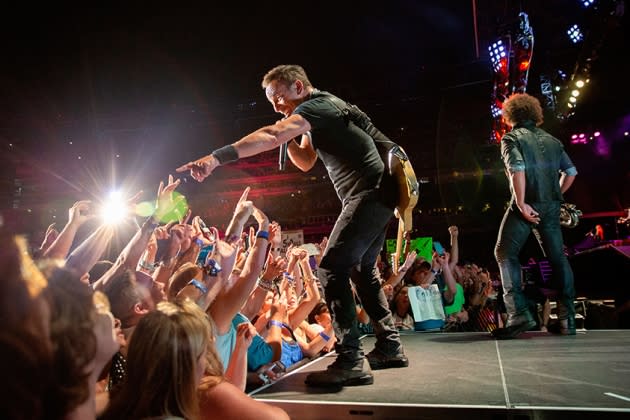New Jersey Congressman ‘Demands Answers’ About Bruce Springsteen and Ticketmaster’s High Ticket Prices
- Oops!Something went wrong.Please try again later.
- Oops!Something went wrong.Please try again later.

UPDATED: New Jersey Congressman Bill Pascrell Jr., a longtime critic of the ticketing business and Ticketmaster in particular, has posted an official call for action against the Live Nation-owned company’s “dynamic pricing” model — particularly in relation to one of New Jersey’s most treasured artists, Bruce Springsteen.
“Today I’ve demanded answers from Ticketmaster on the monopoly’s role in the Springsteen tour fiasco where fans were charged upwards of $5,000 for seats,” Rep. Pascrell wrote in the caption attached to his published letter on Twitter.
More from Variety
Live Nation Posts Robust 2022 Second Quarter, Says It's on Track for a Record Year
Bruce Springsteen's Manager Defends Controversial 2023 Tour Ticketing Rollout
Today I’ve demanded answers from Ticketmaster on the monopoly’s role in the Springsteen tour fiasco where fans were charged upwards of $5000 for seats. pic.twitter.com/K8WGtmH1iX
— Bill Pascrell, Jr. 🇺🇸🇺🇦 (@BillPascrell) August 31, 2022
The letter is addressed to Michael Rapino, president and CEO of Live Nation Entertainment, and starts off by addressing the Springsteen concert and asserts his call for transparency. “To help fans better understand the frustratingly opaque process that leads to such high prices, I am inquiring about the veracity of the company’s statement, as well as the policies and prices the company has put in place for this tour.”
Congressman Pascrell is requesting to view “specific data and any details that support” Ticketmaster’s statement that “these prices and formats are ‘consistent with industry standards for top performers.'” He also posed various other questions, with a deadline of Sept. 30, about Ticketmaster operating Springsteen’s and the E Street Band’s 2023 tour. “How many shows will be played in venues, owned, operated, or exclusively booked by Ticketmaster?,” he asks before following up with, “For how many of these shows is Ticketmaster the primary… or… exclusive ticket seller?” (Presumably he means venues owned by Live Nation.)
“Does your company inform customers as to how many tickets will be available for sale, at what time, and how they will be priced so they can make informed purchasing?”
In response, a rep for Ticketmaster said later on Thursday, “We appreciate and share Congressman Pascrell’s passion for improving the ticketing industry and look forward to continuing our dialogue with him.
“As the resale ticketing market has grown to more than a $10 billion dollar industry over the past few years, artists and teams have lost that revenue to resellers who have no investment in the event going well or any of the people working behind the scenes to bring the event to life. As such, Event Organizers have looked to market-based pricing to recapture that lost revenue.”
The company re-directed readers to statistics regarding the Springsteen ticket sales listed in part below and in detail on the company’s website.
Reps for Springsteen did not immediately respond to Variety‘s requests for comment on Pascrell’s letter.
On the first day of sales for the opening shows on Springsteen’s 2023 arena tour, tickets were in the $4,000-5,000 for mid-range floor seats, and into the four figures for other, less desirable tickets that remained. If these were being offered on the secondary market, offers that large might be expected but what gave fans sticker shock was that these were face-value tickets, with no middleman jacking up the price.
It was an introduction for many fans to Ticketmaster’s “dynamic pricing” program, in which “platinum tickets” — which may be placed anywhere in the arena, from the front section to the back rows — fluctuate in price, in what is said to be ongoing reaction to demand. The system lets ticket prices quickly rise to a level it’s believed resellers would get for them, keeping that extra money in-house for the artist and promoter.
In a response several days later, Ticketmaster — which for decades has received withering criticism from fans — issued statistics to Variety claiming that the majority of tickets (88.8%) had been sold at fixed values of $60-400 before fees, considered reasonable in the current market. The Ticketmaster stats showed only 11.2% of tickets had been the “platinum tickets” subject to dynamic pricing. Ticketmaster further said that the average price of all tickets sold in the first three days of on-sales was $262. The service reported that a majority of tickets, 56%, were priced at under $200.
“Platinum” tickets for the tour that went on sale after the initial, controversial dates did not approach such high prices, suggesting that some kind of cap had been put on the system, although reps said that was not the case.
Both Springsteen and Ticketmaster have been heavily criticized for their ticket prices and have defended themselves in the midst of the fire. Springsteen’s manager, Jon Landau, spoke to the New York Times and said “we looked carefully at what our peers have been doing…We chose prices that are lower than some and on par with others.”
Landau’s statement continued, “Regardless of the commentary about a modest number of tickets costing $1,000 or more, our true average ticket price has been in the mid-$200 range. I believe that in today’s environment, that is a fair price to see someone universally regarded as among the very greatest artists of his generation.”
In March, Rep. Pascrell also wrote to the heads of the Federal Trade Commission and the U.S. Department of Justice urging them to reconsider federal guidelines to make it easier to overturn questionable mergers. In particular, he flagged the Live Nation-Ticketmaster merger as a “posterchild of consolidation gone bad.”
Best of Variety
'The Sopranos' Gets the Funko Pop Treatment in New Collectibles Release
From 'The Sandman' to 'Blonde': Books Made Into Movies and TV Series That You Should Read
Jennette McCurdy's Provocative Book 'I'm Glad My Mom Died' Is Already a No. 1 Bestseller
Sign up for Variety’s Newsletter. For the latest news, follow us on Facebook, Twitter, and Instagram.
